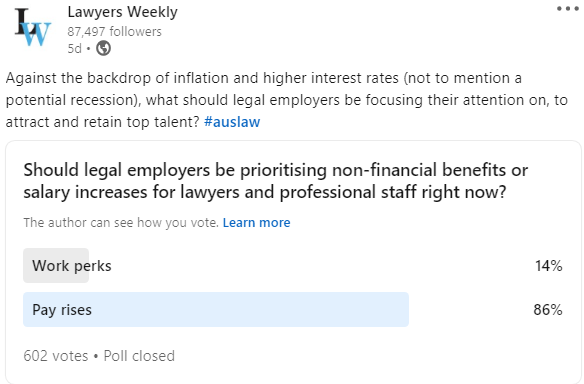With a potential economic downturn on the horizon and mid-level lawyers in higher demand than ever, should firms be offering lawyers increased salaries or simply more perks to keep them happy?

Lawyers Weekly recently asked readers whether they value work perks and initiatives or pay rises more — with the overwhelming majority confirming they’d rather a pay increase than more staff perks.
Moreover, 43 per cent said their employees (across sectors) had expressed concern about increasing workload and burnout — something the legal profession is all too familiar with, despite the rise of flexible working and an increased focus on culture within the profession.
In line with these themes, Lawyers Weekly asked its audience, via a LinkedIn poll, whether, against the backdrop of inflation and higher interest rates, what should legal employers be focusing their attention on to attract and retain top talent: non-financial benefits or salary increases?
At the time of closing, the poll results were as follows:

According to the poll, which had 602 votes, a whopping 86 per cent of lawyers value a salary increase more than non-financial benefits, with just 14 per cent stating that “work perks” are a higher priority for them.
While the poll conducted was, obviously, not a scientific study, it offers an interesting look into what lawyers are placing the most value on in 2023.
Last year, a candidate-short market was reportedly driving legal salaries up across the country, following a turbulent two years and a global pandemic.
And as previously reported by Lawyers Weekly, many legal candidates in the Sydney and Melbourne markets also jumped ship coming out of statewide lockdowns to move either interstate or, when travel restrictions were eventually lifted, overseas — something which made the recruitment of senior and mid-level lawyers, in particular, tougher than ever.
However, as reported by Lawyers Weekly’s sister brand, HR Leader, in February this year, December saw the lowest monthly rise in advertised salary growth since pay packets went up during April–May 2022, with salary growth climbing 0.3 per cent month on month since then.
Beacon Legal director Alex Gotch opined that while salaries will continue rising at BigLaw firms in 2023, it will be at a slower rate than the boom of 2022.
“Australia continues to experience a shortage of quality lawyers, especially within the top-tier, international and large mid-tier firms, and the gap between supply and demand remains high,” he told Lawyers Weekly in February.
“This trend directly impacts lawyers’ salaries, as law firms remain engaged in a competitive recruitment market and use salary and sign-on bonuses as a differentiator, to both attract and retain the best talent.”
While this has resulted in financial incentives such as a “loyalty tax” for firms to retain lawyers and significant salary hikes for entry-level law grad roles, it has also resulted in an increase in people and culture-led initiatives, such as flexibility and value alignment.
Naiman Clarke associate director Kristina Steele confirmed this — and said that many legal employers are already considering and improving company benefit schemes.
“One of the most common motivators recently for Lawyers to seek a new role is to achieve an increase in remuneration,” she told Lawyers Weekly.
“However, the post-COVID ‘candidate’s market’, which saw above market remuneration on offer, is likely to decrease as we enter into a potential economic downturn. Therefore, employers should consider what else can be offered to attract and retain staff.”
Ms Steele said that initiates gaining popularity recently include extensive and generous paid parental leave packages (which you can read more about here), providing private counselling sessions for lawyers and family members, purchased annual leave, paid tertiary education and study leave, legal services discounts when buying or selling a house, discounted financial advice, salary sacrifice, corporate discounts on health insurance or gym memberships, access to continued learning and development opportunities and flexible hours, as well as working from home days.
This comes after multiple legal recruiters stated that firms that don’t make flexibility the norm post-pandemic will be unlikely to attract quality staff and compete in the war for talent, as reported by Lawyers Weekly late last year.
Many law firm leaders have emphasised the importance of flexibility, particularly for working parents, as well as why mastering hybrid working will be key moving forward, especially in a candidate-driven market.
Shine Lawyers unveiled a new nine-day fortnight option for staff in August last year, following the news that Coutts Lawyers & Conveyancers had done the same.
And despite the fact that multiple partners have expressed concerns regarding missed mentoring and learning opportunities in the face of flexible working, many BigLaw firms, including MinterEllison, Clayton Utz and Mills Oakley, are not — and will not — mandate in-office work moving forward.
The legal market is also likely to be impacted by a global economic downturn, as the federal government has grown increasingly concerned about the likelihood of a recession in major economies.
Consequently, Empire Group partner Alison Crowther told Lawyers Weekly late last year that legal salaries are likely to stagnate.
“We will, in fact, revert to the market prior to the COVID-19 boom,” she said.
“Firms will seek to hire smarter, and the overseas drain of candidates will slow as well.”
And in reflection of legal salaries potentially stagnating — or even decreasing — Ms Steele said that while salary will always be of importance, legal candidates shouldn’t overlook non-financial benefits either.
“Perks/benefits are one of the most common motivators for a lawyer to seek and accept a new role, so there is huge sense and worth in employers implementing an attractive benefit scheme for all employees as soon as possible,” she said.
“Lawyers should remember that pay increases/reviews are annual, and achieving a high salary offer upon commencement of employment may have an impact on the next review and potential for increase, as well as an increase in targets. Therefore, perks are a worthwhile and important addition when considering your next move.”

Lauren is the commercial content writer within Momentum Media’s professional services suite, including Lawyers Weekly, Accountants Daily and HR Leader, focusing primarily on commercial and client content, features and ebooks. Prior to joining Lawyers Weekly, she worked as a trade journalist for media and travel industry publications. Born in England, Lauren enjoys trying new bars and restaurants, attending music festivals and travelling.